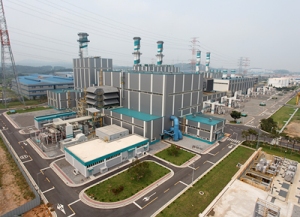Aug 29 2013
Siemens Energy and its partner, GS Engineering & Construction (GS E&C), handed over the most efficient fossil-fired power plant in Asia to the South Korean power utility GS EPS Co. Ltd. The handover of Dangjin 3 (formerly Bugok 3) combined cycle power plant took place twelve days ahead of schedule.
 The site of the Dangjin power plant in Dangjin-City, in the Chungchong Nam-do province about 120 kilometers south of Seoul.
The site of the Dangjin power plant in Dangjin-City, in the Chungchong Nam-do province about 120 kilometers south of Seoul.
Thanks to the main components, Siemens' world record-breaking H-class gas turbine and the special steam cycle, the power plant has a gross efficiency of almost 61 percent and an electrical capacity of 415 megawatts (MW).
The Dangjin 3 power plant is located in Dangjin-City, Chungchong Nam-do Province, approximately 120 kilometers south of Seoul. As the head of a consortium, Siemens built the plant as a turnkey project together with GS E&C and supplied a SGT6-8000H gas turbine, a SST6-5000 steam turbine, an SGen6-2000H hydrogen-cooled generator, a Benson heat recovery steam generator as well as parts of the electrical equipment and the SPPA-T3000 instrumentation and controls system. The company was also responsible for commissioning the power plant.
"We are proud to have built the most modern and most efficient combined cycle plant in Asia," said Roland Fischer, CEO of Siemens Energy's Fossil Power Generation Division. "Thanks to our advanced H-class technology, our customer saves both fuel costs and the cost of maintenance and repairs. So far, eight of the 24 H-class gas turbines we have sold to date have been sold to South Korea. This demonstrates the enormous confidence that the South Korean market places in our technology and our expertise for turnkey power plants."
"At the moment, Korea's biggest challenge is to even out the imbalance between power consumption and demand," emphasized W.K. Lee, CEO of GS EPS. "Our Dangjin 3 power plant uses Siemens technology for maximum flexibility. It is the best available on the market. Thanks to Siemens H-class technology, our plant operates safely, efficiently and economically."
South Korea imports nearly its entire demand for gas in the form of liquid natural gas, transporting it by sea. The efficiency of gas-fired power plants thus plays a crucial role for the country. South Korea is also experiencing a rapid rise in demand for electrical energy, which is why it is planning to expand its generation capacity from 95 gigawatts (GW) today to more than 150 GW by 2030. Gas-fired power plants are expected to account for approximately one-third of this amount. Siemens and its partners are currently building the Ansan, Andong, Posco and Daegu combined cycle power plants in South Korea. The company will equip all four plants with H-class gas turbines as well as other main components consisting of generators, steam turbines and heat recovery steam generators.
Highly efficient combined cycle power plants are part of Siemens' Environmental Portfolio. In fiscal 2012, revenue from the Portfolio totaled about €33 billion, making Siemens one of the world's largest suppliers of ecofriendly technologies. In the same period, our products and solutions enabled customers to reduce their carbon dioxide (CO2) emissions by more than 330 million tons, an amount equal to the total annual CO2 emissions of Berlin, Delhi, Hong Kong, Istanbul, London, New York, Singapore and Tokyo.
For further information on the SGT6-8000H gas turbine, please see www.siemens.com/energy/SGT6-8000H